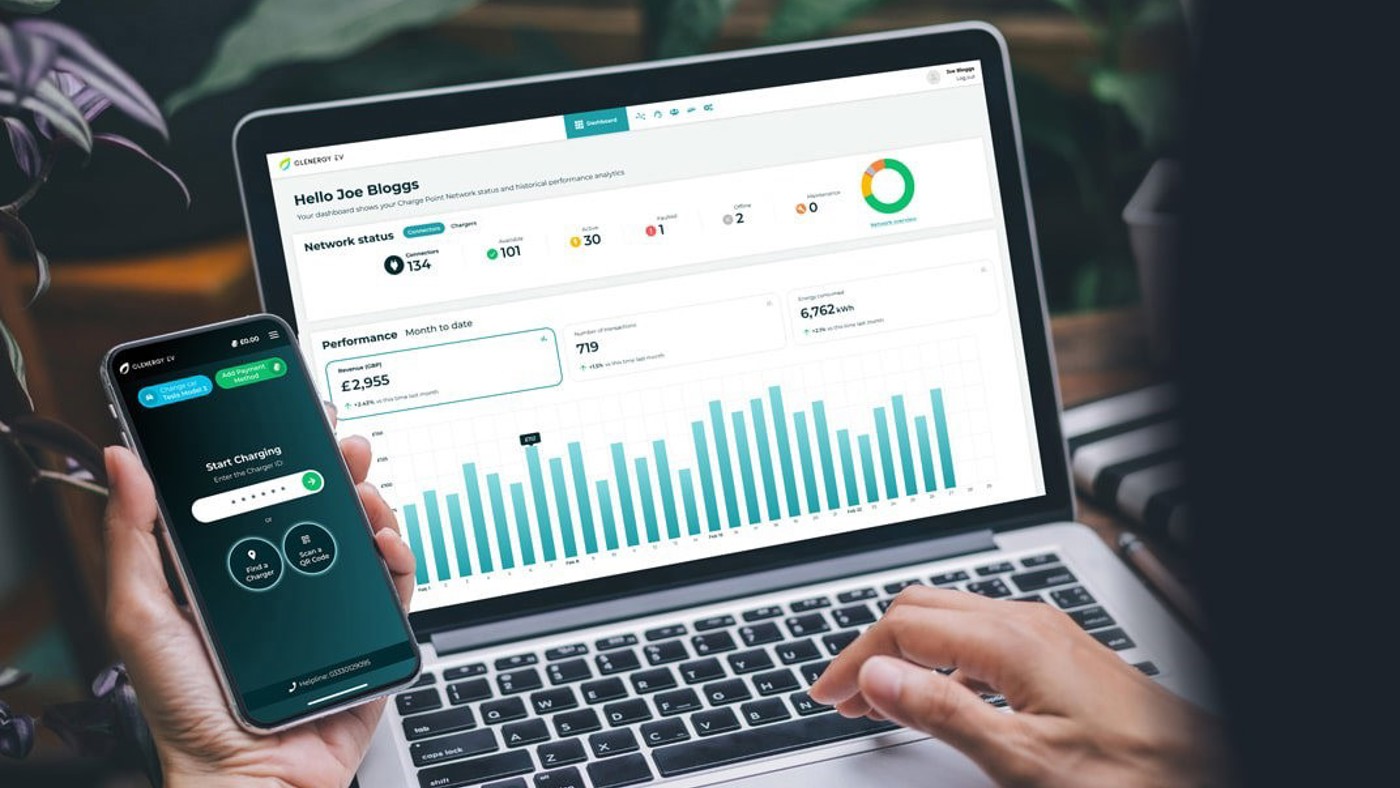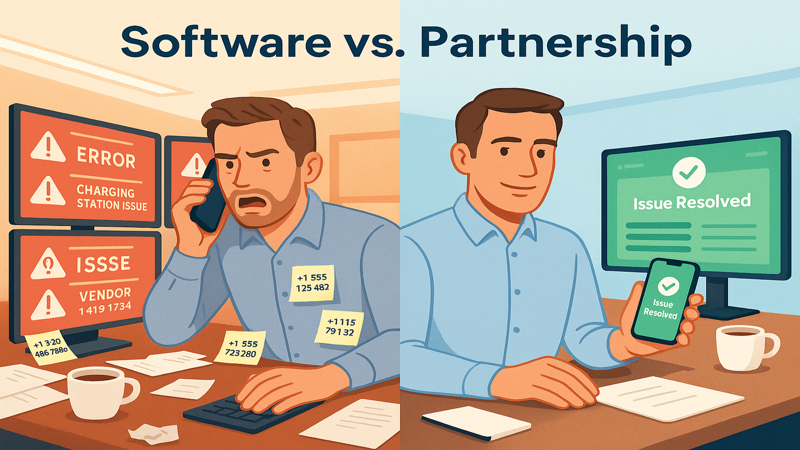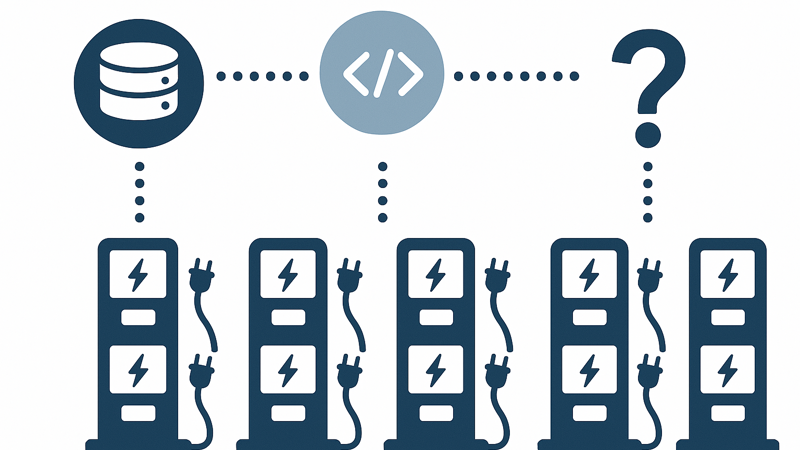
White Label EV Charging Software: The Pros and Cons
When entering the EV charging industry, companies are faced with a choice. Do you develop your own in-house EV charging software and app, or do you choose an off-the-shelf solution?
It’s a big decision with huge implications for your business approach, so read on for some clarity on what a white-label software option looks like, and what the main pros and cons are.
So, what exactly is a charge point software white label?
A white label is a pre-built software solution developed by one company that is rebranded to reflect the look and feel of another company.
Why do companies use charge point software white labels?
As of 2024, to comply with government regulations, public charging stations must be equipped with contactless payment terminals when providing a certain speed of charging, be backed with a 24/7 driver support line, and more. Setting these up can cause a lot of operational strain, and stop companies from focusing on areas of key revenue generation. A white label can be a quick solution, allowing companies to utilise another company's expertise. Buying in a solution allows more time to focus on their core business offering, without missing out on that competitive edge.
Some companies simply don’t have the resources to pour into these kinds of projects, so white-label solutions are a perfect solution.
How customisable is a charge point software white label?
One of the brilliant things about white labelling is the flexibility and customisation options available for your business. You can still strengthen your brand and have a strong presence using a white-label solution to stand out from competitors.
Customisable options often include:
-
Logo
-
Brand imagery
-
Colour palette
-
Brand language
-
Iconography
How fast can a white label be implemented?
A white-label charge point platform can typically be implemented within six weeks. A white label provider, like Clenergy EV requires things such as logo, brand colours, iconography, and imagery - then it’s over to us to build the platform specifically for your needs.
Is it secure to use a white label?
It’s often more secure to use a white label than to develop your own software. Companies that develop white labels will pride themselves in hitting those all-important standards such as ISO:27001 and Cyber Essentials. In our case, we’ve recently renewed these qualifications, and have a blog explaining a deeper breakdown of our security practices for those looking for peace of mind in their white-label solution.
Do I have to tell my customers I’m using a white label?
It’s completely up to you if you inform customers that you are using a white label for your charge point software. You may want to look at co-branding with your white-label software provider, if they are a recognised name within the industry.
It’s common to ask your white-label software provider to sign a non-disclosure agreement (NDA) to give your business confidentiality if this is a requirement.
How flexible is a white-label charge point solution?
If you have stumbled across a white label that is almost perfect, you could reach out and discuss your business needs with their support team. Although some off-the-shelf solutions can be rigid, often software developers are improving and working on new features in the background. The feature you’re hoping for could always be in development.
Some white labels carry out forums with clients to discuss potential improvements, amends, and features. At Clenergy EV we develop our Charge Point Management System based on feedback from our clients.
So, onto the burning question...should you use a white-label charge point software platform?
There are several questions to ask yourself before embarking on the journey. Let’s explore some of the pros and cons!
Pros of using a white label charge point platform
Saves you time
-
A white label is a pre-packed, pre-tested solution that can save your business a lot of time in the long run.
-
Time constraints are something to bear in mind as it can be a lengthy process to design, develop, and test software in-house.
-
By utilising an out-of-the-box solution, you can deploy to market much quicker.
Cost
-
The upfront fee to use a white-label charge point solution is often a small fraction of the budget you could spend on developing software yourself.
Skills and expertise
-
Charge point software is devised and developed by a team of experts. Finding the right staff members with the correct experience is a challenge.
Updates
-
You can focus on running your business with the peace of mind that any software updates and any dreaded ‘bug’ fixes will be dealt with by the white-label development team.
-
Software is constantly evolving and it can be tough to keep up with the latest standards. Failing to keep up with the latest updates can risk your software being obsolete or unsupported. Luckily this is something you won't have to worry about.
Knowledge
-
Are you going to know exactly what your customers need from your software features? White-label providers would have embarked on their own market research before investing in the development of features and bringing new tools to market.
-
Having EV industry knowledge and an in-depth understanding of OCPP would be a crucial point to consider. If you aren’t well versed in the subject, it could take a vast amount of time to undertake market research.
Cons of using a white label charge point platform
Control
-
With white label platforms, you’ll commonly have less control over which direction the software is going in the future, for example, which features are developed.
-
Designing and developing your own software can give your organisation complete control over the features you offer your customers. This means you can build exactly what your organisation needs.
Reliant on others
-
When using a third-party software provider you can be locked into ongoing subscriptions or contracts.
-
If your third-party software provider goes out of business, you could be left in the lurch.
Rigid
-
White labels are often quite static and don’t always cater to your exact business needs.
-
If you are looking to move into a different area of business in the future, a white label won’t always be able to support this type of structural change.
Summary
It’s important to have a clear understanding of the problem your software will be solving.
If you're short on time, investing in an off-the-shelf charge point software solution can help you launch your offering to market more quickly.
Does this sound like something you require as a charge point operator?
Choosing the right white-label development team is crucial. You'll want someone with the flexibility to meet your business needs and a deep understanding of the industry. Our experienced team conducts thorough research into customer journeys to continually enhance our platform. We can support both new and established charge point operators to grow charger networks.


